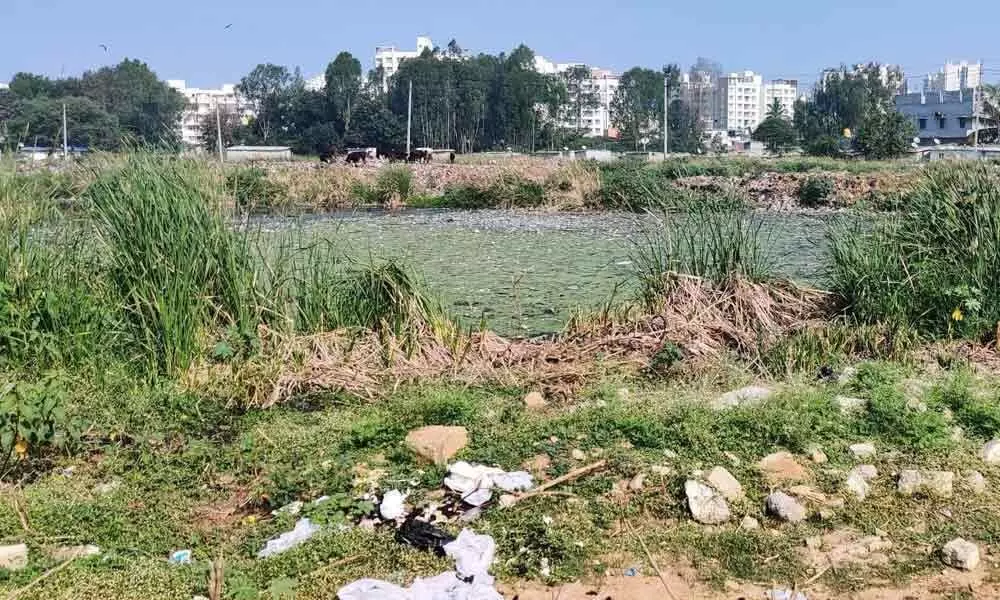Live
- Reckless, Dangerous Arms Race
- Russia needs a peace deal as it is running out of soldiers
- MyVoice: Views of our readers 25th November 2024
- Lack of planning, weak narrative behind MVA debacle
- UTF dist unit golden jubilee celebrations begin
- TSIC launches ‘Innovations 101’ coffee table book
- Drone technology for crime control
- Do you support caste census? Which one will you prefer caste census or skill census?
- DSS to launch gender campaign today
- MJCET holds first-ever 24-hr datathon
Just In
Karnataka High Court orders formation of district level lake protection committtess


Karnataka High Court orders formation of district level lake protection committtess
The Principal Bench of the Karnataka High Court headed by Chief Justice Abhay Oka, on June 15, ordered formation of district-level Lake Protection Committees except for the areas covered by municipal corporations.
Bengaluru: The Principal Bench of the Karnataka High Court headed by Chief Justice Abhay Oka, on June 15, ordered formation of district-level Lake Protection Committees except for the areas covered by municipal corporations.
The order was issued in response to an application made by Leo F. Saldanha, Coordinator of Environment Support Group.
In its order, the High Court has taken note of the absence of district-level Lake Protection committees in the 2012 direction, and now directed the constitution of such committees in all districts in State. The court opined that such committees are essential to supervise the implementation of the directions of the 2012 judgment. The district committees will have jurisdiction over all lakes and such other water bodies in the entire district, except those that are within Municipal Corporation and Municipal Council areas, which will be governed by specific committees. The court has ordered for the formation of the committees only at the district level and found no need for the similar formation at ward and gram panchayat level.
The chairperson of the committee will be headed by the Deputy Commissioner of the district while the Chief Executive Officer (CEO) if the Zilla Panchayat, higher officer from the forest department, higher officer from the minor irrigation department and a higher officer from the Karnataka State Pollution Control Board (KPSCB) will be the members. The member secretary of the District Legal Services Authority will be the secretary of the committee. The members from the forest department, minor irrigation department and the KSPCB will be nominated by the State.
The court said that instead of the deputy commissioner of the district, the jurisdictional Assistant Commissioner shall be the member if the committee constituted for the municipal corporation of the municipal areas.
The committee has been given the task to implement the orders passed by the High Court in 2012. The Court directed that survey of lakes and tanks in Karnataka shall be undertaken by demarcating the boundaries. It was directed that proper fencing shall be erected around the lakes. This Court directed that buffer zones having width of
thirty meters around all the lakes shall be maintained and also directed for removal of unauthorized construction thereon.
The ESG Lakes PIL was heard for several years after it was filed in 2008. The final judgment was delivered on April 11, 2012 directing the State of Karnataka to ensure that local communities were
involved in lake rehabilitation and management, and that their regulation was devolved to lake protection committees constituted for major urban areas (corporations and councils). The Court
also constituted a committee under then sitting Judge of the Court, Justice Mr. N.K. Patil. This Committee submitted two reports based on inputs and participation of highest ranking officials
of 8 agencies of the State directly involved in lake protection and management, Commissioner of Bruhat Bengaluru Mahanagara Palike (BBMP), and ESG, amongst others. However, the 2012 order did not cover the lakes in rural areas.
The Court observed in its order that it is "inappropriate to make extensive modifications" to the 2012 judgement. However, liberty was granted to the petitioner to draw the attention of the Court to
any lack of compliance with its orders, to suggest engagement of experts as special invitees to meetings of the committees, and to seek open hearings of these committees for considering citizens' grievances.

© 2024 Hyderabad Media House Limited/The Hans India. All rights reserved. Powered by hocalwire.com






